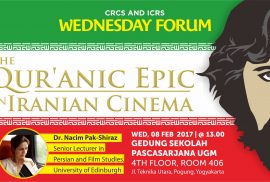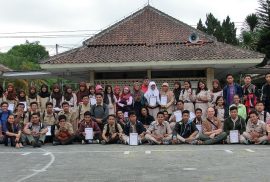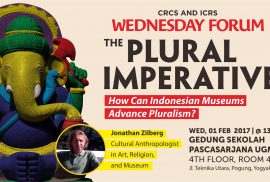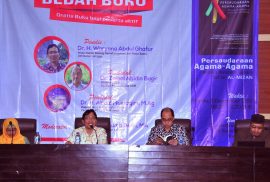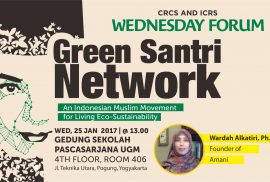Dian Andriasari | SPK-CRCS | Opini

Agama dan negara memiliki relasi yang erat dalam kehidupan bernegara di Indonesia. Pembukaan Undang-Undang Dasar 1945 alinea ketiga menyatakan kemerdekaan Indonesia adalah “atas berkat rahmat Allah Yang Maha Kuasa.” Kalimat dalam alinea ketiga Pembukaan UUD 1945 itu adalah salah satu representasi pengakuan negara terhadap eksistensi agama, meskipun Indonesia menyatakan dirinya sebagai negara kesatuan yang mengakui keragaman melalui semboyan bhinneka tunggal ika. Indonesia merupakan suatu bangsa yang multietnis dan multireligius, dan rakyatnya memiliki multiidentitas.
Dalam ranah praksis, agama tidak semata berupa ritus, liturgi, doa atau pengalaman mistik yang bersifat personal dan unik. Agama juga hadir dan manifes dengan cara yang kadang tidak dikehendaki pemeluknya sendiri. Di satu sisi agama dapat menjadi sarana integrasi sosial; di sisi lain agama dapat menjadi instrumen yang cukup efektif dalam memicu disintegrasi sosial.
Relasi agama dan negara merupakan persoalan yang banyak menimbulkan perdebatan. Ketegangan hubungan agama dan negara dipicu antara lain oleh konstelasi sosial-budaya di Indonesia yang heterogen. Namun negara mengatur hak kebebasan beragama melalui Pasal 28E ayat (1) UUD 1945. Artinya secara konstitusional negara memiliki kewajiban untuk menjamin kebebasan beragama dan berkeyakinan sebagaimana dimandatkan oleh konstitusi. Pemerintah juga telah meratifikkasi Kovenan Internasional Hak-hak Sipil dan Politik yang menambah jaminan kebebasan beragama dan berkeyakinan.
Perkembangan demokrasi di beberapa negara menunjukkan bahwa kehidupan bersama dalam masyarakat majemuk bisa berdiri jika ditopang oleh beberapa pilar. Pilar pertama adalah konstitusi yang mengandung prinsip akuntabilitas yang mengontrol perimbangan kekuasaan dan penerimaan/pengakuan hak-hak warga negara (hak sipil, politik, sosial, ekonomi dan kultural). Proses mencapai tujuan negara demokrasi juga bertumpu pada pengembangan cita hukum sebuah negara, hukum yang melahirkan regulasi guna mewujudkan perlindungan dan ketertiban sosial.
Hakikat hukum bertumpu pada ide keadilan dan kekuatan moral. Ide keadilan tidak pernah lepas dari kaitan hukum, sebab membicarakan hukum, baik jelas maupun samar-samar, senantiasa merupakan pembicaraan mengenai keadilan (Satjipto Rahardjo, 1986:46). Kekuatan moral juga adalah unsur hakikat hukum, sebab tanpa adanya moralitas, hukum akan kehilangan supremasi dan independensinya. Keadilan dan ketidakadilan menurut hukum diukur dan dinilai oleh moralitas yang mengacu pada harkat dan martabat manusia.
Embrio formalisasi pengaturan agama oleh negara pertama kali disampaikan oleh Prof. Oemar Senoadji, SH dalam simposium “Pengaruh Kebudayaan dan Agama Terhadap Hukum Pidana” di Bali pada tahun 1975 dengan tulisan beliau berjudul “Delik Agama”. Oemar Senoadji mengemukakan landasan dan urgensi mengapa negara perlu mengatur agama. Landasan dan urgensi tersebut kemudian melahirkan beberapa teori-teori delik agama. Teori-teori tersebut bermaksud menjelaskan landasan teoritik atau latar belakang pemikiran konseptual mengenai perlunya dilakukan kriminalisasi terhadap delik agama.
Beberapa catatan penting dari landasan teoretik tersebut di antaranya adalah: Pertama. Religionsschutz-Theorie (teori perlindungan “agama”). Menurut teori ini, “agama” itu sendiri dilihat sebagai kepentingan hukum atau objek yang akan dilindungi (atau yang dipandang perlu untuk dilindungi) oleh negara melalui peraturan perundang-undangan yang dibuatnya. Kedua, Gefühlsschutz-Theorie (teori perlindungan “perasaan keagamaan”). Menurut teori ini, kepentingan hukum yang akan dilindungi adalah “rasa/perasaan keagamaan” dari orang-orang yang beragama. Ketiga, Friedensschutz-Theorie (teori perlindungan “perdamaian/ ketentraman umat beragama”). Objek atau kepentingan hukum yang dilindungi menurut teori ini adalah “kedamaian/ketentraman beragama interkonfessional di antara pemeluk agama/kepercayaan.”
Di dalam KUHP (WvS) selama ini tidak ada bab khusus mengenai delik agama, walaupun ada beberapa delik yang dapat dikategorikan juga sebagai delik agama dalam ketiga pengertian di atas. Delik agama dalam pengertian yang pertama (yaitu “delik menurut agama”) banyak tersebar di dalam KUHP karena pada dasarnya sebagian besar delik dalam KUHP juga terlarang menurut agama, seperti delik pembunuhan, pencurian, penipuan/perbuatan curang, penghinaan, fitnah, perkosaan, dan seterusnya. Artinya hal-hal yang dilarang dalam KUHP juga merupakan hal-hal yang dilarang ajaran agama.
Sedangkan delik agama dalam pengertian yang kedua terlihat dalam Pasal 156a, yakni penodaan terhadap agama dan melakukan perbuatan yang bertujuan agar orang tidak menganut agama. Oemar Senoadji turut memasukkan delik dalam Pasal 156-157 (penghinaan terhadap golongan/penganut agama, atau dikenal dengan istilah “group libel”) ke dalam kelompok delik agama dalam pengertian yang kedua.
Sebenarnya agak sulit untuk memasukkan Pasal 156-157 ke dalam kelompok “delik terhadap agama”, karena golongan/kelompok agama tidak identik dengan “agama”. Delik ini sulit untuk dikualifikasi sehingga pada praktiknya pasal ini akan mudah ditarik ke dalam berbagai keadaan atau situasi dan rentan terhadap penyelundupan hukum. Hal semacam ini akan berbahaya dan mengancam iklim demokrasi di Indonesia, bahkan mencederai marwah “negara hukum.”
Adapun delik agama dalam pengertian yang ketiga (“yang berhubungan dengan agama atau kehidupan beragama”) di dalam KUHP tersebar antara lain dalam Pasal 175-181 dan rancangan pasal 503 di buku II RUU KUHP yang sedang dibicarakan.
Dengan memperhatikan pengaturan pasal-pasal KUHP tersebut, terlihat jelas bahwa pada mulanya tidak ada delik yang ditujukan terhadap agama (pengertian delik agama kedua). Yang diatur dalam KUHP hanya delik-delik yang berhubungan dengan agama (pengertian ketiga). “Delik terhadap agama” (pengertian kedua) masuk pada tahun 1965 ke dalam KUHP, yaitu dengan ditambahkannya Pasal 156a ke dalam KUHP.
Dari perspektif politik hukum pidana yang hendak disasar pada masa itu dan dengan melihat aspek redaksional Pasal 156a itu, jelas terlihat bahwa delik yang dirumuskan ditujukan terhadap “agama” dan bukan pada terganggunya perasaan agama atau ketertiban masyarakat pada umumnya. Penambahan Pasal 156a ke dalam KUHP itu berdasarkan pada Pasal 4 UU No. 1/PNPS/ 1965 yang pada awalnya berbentuk Penpres. Perumusan tersebut tampak berlandaskan pada “Religionsschutz-theorie”. Dengan kata lain, ada divergensi atau ketidakharmonisan antara “status dan penjelasan delik” dengan “teks dan rumus delik”.
Ada bab khusus mengenai delik agama dalam konsep KUHP yang baru (RUU KUHP), yang berjudul “Tindak Pidana Terhadap Agama dan Kehidupan Beragama”. Bab khusus ini sudah sudah direncanakan sejak konsep pertama Buku II tahun 1977 sampai dengan konsep tahun 2014 dan merupakan bagian dari upaya pembaharuan kebijakan hukum pidana di Indonesia. Konsep baru KUHP ini mengkaji ulang KUHP warisan zaman Belanda yang menempatkan delik-delik yang berkaitan dengan keagamaan ke dalam salah satu bagian dari delik terhadap “ketertiban umum”.
Problem mendasar dari hal-hal ini adalah apakah fakta bahwa agama menjadi salah satu “objek” yang dilindungi oleh negara sejalan dengan amanat konstitusi berupa jaminan kebebasan beragama? Ataukah justru politik hukum pidana telah benar-benar secara nyata menghegemoni agama dan menjadikannya sebagai alat politisasi belaka?
*Penulis, Dian Andriasari, adalah dosen Fakultas Hukum Universitas Islam Bandung dan alumnus Sekolah Pengelolaan Keragaman (SPK) VIII CRCS UGM. Tulisan ini pertama kali dipublikasikan di satuharapan.com dengan judul Delik Agama: Hegemoni Negara terhadap Agama? Tulisan diterbitkan lagi di web ini dengan beberapa suntingan.
News

Abstract
Iranian cinema is one of the very few in the Muslim world to have employed this new medium in imagining and narrating stories of religious figures. The representation of religious figures in Islam has become particularly controversial in recent years. Therefore, it turned into a highly sensitive undertaking. In this talk I examine the complex socio-political context of Iran to study late emergence of the epic genre in Iranian cinema. In doing so I study the recent creation and development of ‘Qur’anic Films’ within Iranian cinema with specific reference to Kingdom of Solomon (Mulk-i Sulayman-i Nabi, Shahriar Bahrani, 2010), which I argue is the first Qur’anic epic in Iranian cinema if not in the Muslim world.
Speaker
Dr Nacim Pak-Shiraz is the Head of Persian Studies and Senior Lecturer in Persian and Film Studies at the University of Edinburgh. She is the author of Shi’i Islam in Iranian Cinema: Religion and Spirituality in Film (London, 2011) and a number of articles and chapters in the field of Iranian Film Studies. Dr. Pak-Shiraz also regularly collaborates with a number of film festivals, including the Edinburgh International Film Festival and The Edinburgh Iranian Festival.
Suhadi | CRCS | Perspektif

Bertebarannya hoax, provokasi, dan ujaran kebencian berbasis agama akhir-akhir ini merupakan fenomena yang sangat memprihatinkan. Untuk mengatasi hal ini, dengan tujuan yang berjangka panjang, pendidikan adalah hal yang tak bisa diabaikan.
Menyoroti hal itu, pada pertengahan Januari 2017, Jokowi memanggil Menag, Mendikbud, dan Menristekdikti. Sebagaimana diberitakan kemudian, menurut keterangan Menteri Agama Lukman Hakim Saifuddin, Presiden Jokowi antara lain memberikan pesan tentang pentingnya pengembangan pendidikan karakter bangsa terutama melalui pendidikan agama. Dengan bahasa lugas, Presiden berharap tiga menteri tersebut memberikan perhatian pada pengembangan pendidikan agama yang tidak konfrontatif, tapi “promotif”, yakni pendidikan yang mempromosikan religiositas dan sekaligus menghargai kebinekaan.
Dua aspek dari bangsa Indonesia menjadi pertimbangan dari upaya itu: di satu sisi, masyarakat Indonesia adalah masyarakat yang religius, atau setidaknya memiliki identitas keagamaan yang kuat; dan di sisi lain Indonesia memiliki kemajemukan agama yang sangat tinggi baik antaragama maupun intraagama. Kuatnya identitas agama di Indonesia itu diperkuat oleh hasil survei Pew Research Institute 2015 yang menyebutkan 95% orang Indonesia menyatakan agama penting bagi kehidupan mereka.
Temuan Penelitian
Penelitian tentang peran agama dan/atau pendidikan agama di sekolah dan pembentukan karakter siswa telah banyak dilakukan. CRCS UGM sendiri setidaknya telah mempublikasikan dua buku hasil penelitian dalam bidang ini.
Pertama, penelitian dengan judul Politik Ruang Publik Sekolah: Negosiasi dan Resistensi di SMUN di Yogyakarta (Hairus Salim HS, dkk, 2011). Buku ini menyajikan etnografi tiga sekolah negeri, dari yang toleran, “biasa”, dan kurang toleran terhadap kemajemukan. Penelitian ini tidak secara khusus mengkaji pendidikan agama dalam ruang kelas, tetapi tentang proses pembentukan ruang publik sekolah dan pengaruhnya terhadap relasi antar siswa.
Kedua, penelitian dengan judul Politik Pendidikan Agama: Kurikulum 2013 dan Ruang Publik Sekolah (Suhadi, dkk, 2014). Terbitan penelitian ini membahas genealogi atau asal usul pendidikan agama dalam sistem pendidikan nasional di Indonesia serta aspek politik pendidikannya dari satu rezim ke rezim lain setelah Indonesia merdeka. Penelitian ini juga mengkaji persoalan “kompetensi spiritual” dalam Kurikulum 2013.
Penelitian lain tentang pendidikan agama terkini juga telah dilakukan oleh Pusat Pengkajian Islam dan Masyarakat (PPIM) UIN Syarif Hidayatullah yang fokus pada content analysis buku-buku teks ajar Pendidikan Agama Islam (PAI) dari SD sampai SMA yang diterbitkan oleh Kementerian Pendidikan dan Kebudayaan (Kemendikbud). Policy brief dari riset ini diterbitkan pada September 2016 dengan judul Tanggung Jawab Negara terhadap Pendidikan Agama Islam.
Latar dari penelitian tersebut adalah fenomena protes dari masyarakat di beberapa daerah yang menemukan pernyataan intoleransi dan kekerasan dalam buku-buku dan Lembar Kerja Siswa (LKS) PAI. Salah satu dari pernyataan itu, misalnya, dapat ditemukan dalam sebuah LKS PAI Kelas XI SMA di beberapa daerah sekaligus (Jombang, Depok, Jakarta, Bandung) yang memuat kalimat “yang boleh dan harus disembah hanyalah Allah SWT, dan orang yang menyembah selain Allah, telah menjadi musyrik dan boleh dibunuh.” Meskipun pernyataan itu tak mengacu secara khusus ke suatu agama, tim PPIM mengkhawatirkan pernyataan itu dalam konteks Indonesia dapat disalahpahami merujuk pada pemeluk agama tertentu di luar Islam (PPIM 2016:4)
Sebagaimana disebutkan dalam policy brief PPIM itu, setelah ditelusuri LKS tersebut ternyata menyalin secara utuh buku Pendidikan Agama Islam dan Budi Pekerti Kelas XI SMA yang dipublikasikan oleh Kemendikbud (Mustahdi dan Mustakim 2014; PPIM 2016: 4). Walhasil, sinyalemen bahwa ada potensi intoleransi dan kekerasan dalam buku teks PAI bukanlah mengada-mengada.
Ketika diwawancarai tim peneliti PPIM, pejabat Kemendikbud menyebutkan mengapa hal tersebut bisa terjadi. Menurutnya, proses penyusunan dan penerbitan buku-buku tersebut bersifat kejar tayang atau terpepet dari sisi waktu, sehingga hasilnya tidak maksimal. Namun peneliti PPIM memandang buku-buku PAI bisa dimasuki pernyataan seperti di atas karena pemerintah tidak memiliki visi menjadikan PAI sebagai bagian dari politik kebudayaan nasional atau bagian dari upaya memperkuat Islam rahmatan lil’alamin (PPIM 2016: 6).
Berpikir Lebih Mendasar
Banyak pihak telah lama menyarankan pemerintah secara serius memikirkan dan mengupayakan perbaikan PAI yang kontekstual dengan keindonesiaan dengan ragam agama, paham kegamaan, dan etniknya. Persoalan memperbaiki kurikulum PAI tidaklah semudah membalikkan tangan. Untuk hasil yang lebih maksimal ada perlu perubahan pola pikir dalam memandang pendidikan agama yang lebih mendasar.
Pertama, Pendidikan Agama (PA) secara umum, tidak terkecuali PAI, dalam sejarahnya memuat beban ideologis. Sebelum tahun 1966, Pendidikan Agama (PA) bukan mata pelajaran wajib, tetapi pilihan. Namun instruksi TAP MPRS No. XXVII/MPRS/1966 tentang Agama, Pendidikan dan Kebudayaan kemudian menetapkan PA sebagai mata pelajaran wajib bagi semua siswa. Pewajiban tersebut, pada waktu itu, berkaitan dan berhubungan dengan bias anti-komunisme. Artinya, ada aspek semangat penegasian sang liyan. Karena sentimen anti-komunisme ini dan agama yang diakui oleh perundang-undangan saat itu (masih berlaku hingga saat ini) hanya enam agama, maka pendidian agama di luar enam agama tersebut tidak pernah ditawarkan sepanjang sejarah.
Untuk konteks saat ini, hal yang penting adalah bagaimana menggeser paradigma tersebut ke arah yang lebih positif. Saya tidak sedang ingin mengusulkan kembali PA menjadi tidak wajib lagi, tetapi bagaimana keberadaannya yang wajib kini lebih memiliki semangat positif. PAI harus keluar dari perspektif negatif menuju perspektif yang lebih positif dalam melihat perbedaan agama dan paham. Tanpa perubahan paradigma yang mendasar, harapan terhadap PAI, bahkan juga pendidikan agama lain, untuk menjadi “promotif” dan tidak konfrontatif akan sulit tercapai.
Kedua, kurikulum terbaru yang berlaku saat ini, yakni Kurikulum 2013 (selanjutnya disingkat K-13), tidak lagi menjadikan Pendidikan Agama sebagai satu-satunya ruang untuk menanamkan nilai-nilai keagamaan/spiritualitas. K-13 memperkenalkan konsep Kompetensi Inti (KI) dan Kompetensi Dasar (KD). KI kemudian diturunkan ke dalam empat kompetensi: kompetensi spiritual (KI-1), kompetensi sosial (KI-2), kompetensi pengetahuan (KI-3) dan kompetensi keterampilan (KI-4). Oleh karena itu kompetensi agama/spiritual tidak lagi hanya menjadi tanggung-jawab PA, tapi semua mata pelajaran. Artinya, agenda perbaikan terhadap kurikulum dan buku teks PAI tidak niscaya menyelesaikan masalah yang diprihatinkan di atas. Maka kita sekaligus juga harus memeriksa rumusan KI-1 yang tersebar di semua mata pelajaran.
Ketiga, banyak di antara pemerhati dan praktisi pendidikan sering terjebak menyederhakan tujuan pendidikan dalam kaitannya dengan tanggung jawab mata pelajaran tertentu. Misalnya, ketika dalam UU No. 20 tahun 2003 tentang Sisdiknas disebutkan bahwa tujuan pendidikan adalah mendorong peserta didik agar menjadi “manusia yang beriman dan bertakwa kepada Tuhan Yang Maha Esa”, tujuan itu dianggap menjadi tanggung jawab mata pelajaran PA. Sementara itu tujuan pendidikan untuk mendorong “menjadi warga negara yang demokratis serta bertanggung jawab” seringkali dianggap menjadi beban Pendidikan Pancasila dan Kewarganegaraan (PPKn). Paradigma semacam ini mengakibatkan adanya ambiguitas, yaitu PPKn mengajarkan keterbukaan sosial kebangsaan, sementara PA mengajarkan ketertutupan sosial kebangsaan.
Pemahaman ambigu tersebut seharusnya diakhiri. Mendorong lahirnya generasi bangsa yang “demokratis”, “bertanggung jawab”, “mandiri”, dan seterusnya, juga merupakan tanggung jawab pendidikan agama. Oleh karena itu, kurikulum PA seharusnya tidak saja berkutat pada keimanan dan ketakwaan, tapi juga hal-hal yang menyangkut sosial dan kebangsaan.
Perbaikan kurikulum terhadap buku teks yang konfrontatif memang menjadi agenda mendesak yang perlu segera dilakukan. Lebih dari itu, kita perlu memperbaiki hal-hal mendasar yang menyangkut paradigma dan pola pikir kita tentang pendidikan agama apabila mengharapkan pendidikan agama menjadi mata pelajaran yang lebih promotif terhadap nilai-nilai kebinekaan bangsa Indonesia.
*Penulis, Suhadi, adalah dosen Program Pascasarjana UIN Sunan Kalijaga dan associate researcher di Center for Religious and Cross-cultural Studies (CRCS), Sekolah Pascasarjana UGM.

Abstract:
In this discussion, Jonathan Zilberg will discuss problems fracing Indonesian museum in terms of performance, accountability and transparency. He will discuss the Goverment of Indonesia’s 2010-2014 museum revitalization program, the transformations that have been taking place in Indonesia museum over the last decade and the challenges posed for the future. He will look at museums as democracy machines and as postcolonial centers for advacing the ideology of pluralism in civil society. In particular he will address the integrated importance of museums, adchives and libraris for advacing the state of education at all levels including for countinuing adult education.
Speaker:
Jonathan Zilberg is a cultural anthropologist specializing in art and religion and in museum ethnography. He has been studying Indonesian museums for a decade and is particularly interested in museums as democracy machines and as post-colonial centers for advancing the ideology of pluralism in civil society. His immediate interests focus on Hindu-Buddhist heritage including the function of archaeological sites as open air museums as well as of museum collections and government depositories in terms of being under-utilized academic resources. For comparative purposes, he has studied museums in Aceh, Jambi, Jakarta and to a lesser extent observed select museums elsewhere in Indonesia. Currently he is CRCS UGM Visiting Scholar.
A. S. Sudjatna | CRCS | Event Report

Secara historis dan genealogis, Yahudi, Kristen, dan Islam mengklaim memiliki hulu yang sama, yakni dari Ibrahim atau Abraham. Ketiga agama ini kerap mendaku dirinya masing-masing sebagai agama penerus dari tradisi Ibrahimiah, Abrahamic religion, atau millah Ibrahim. Karenanya, tak heran jika sampai saat ini, ketiga agama ini kerap bersaing dalam klaim kebenaran sebagai yang paling Abrahamic, atau sebagai pewaris paling sah atas millah Ibrahim yang mendakwahkan monoteisme sebagai inti ajarannya.
Di Indonesia sendiri, para pemeluk Islam dan Kristen tak jarang terlibat konflik, baik secara terbuka maupun tertutup. Gesekan demi gesekan, kasus demi kasus dalam perebutan pengaruh dan klaim terus berlanjut hingga saat ini dengan tren fluktuatif. Faktor kekhawatiran atas kondisi semacam inilah yang kemudian menggerakkan Dr. H. Waryono Abdul Ghafur, Wakil Rektor Bidang Kemahasiswaan dan Kerjasama UIN Sunan Kalijaga, Yogyakarta, menulis sebuah buku berjudul Persaudaraan Agama-Agama: Millah Ibrahim dalam Tafsir al-Mizan. Harapannya, dengan memahami substansi dari millah Ibrahim sebagai hulu dari Islam dan Kristen serta Yahudi, setiap pemeluk agama-agama ini dapat menangkap kesan persaudaraan yang hadir di dalamnya.
Untuk tiba pada pemahaman akan hadirnya garis persaudaraan di antara agama-agama penerus millah Ibrahim ini, ada tiga terma penting yang harus dipahami terlebih dahulu, yakni millah, din dan syariat. Ketiga terma ini biasanya diterjemahkan dengan agama saja di dalam Bahasa Indonesia. Padahal ketiganya memiliki makna yang berbeda. Secara ringkas, din dapat dipahami sebagai agama secara umum; sedangkan millah dimaknai sebagai tradisi; dan syariat adalah cara atau jalan tertentu yang khusus bagi suatu umat atau dapat juga dipahami sebagai cara atau ajaran nabi tertentu terhadap umatnya yang akan berbeda dengan cara nabi lainnya, misalnya syariat shalat dan puasa umat Nabi Muhammad yang berbeda dengan syariat puasa dan shalatnya umat nabi-nabi terdahulu. Dalam hal ini, millah Ibrahim dapat dipahami sebagai tradisi Ibrahim di dalam beragama yang memiliki seperangkat cara/syariat tertentu.
Menanggapi buku setebal 274 halaman yang diterbitkan oleh penerbit Mizan ini, Dr. Abdul Mustaqim, Ketua Program Studi Ilmu Al-Quran dan Tafsir UIN Sunan Kalijaga, yang menjadi pembedah pertama buku tersebut, mengatakan bahwa konsep millah Ibrahim ini dapat menjadi basis teologis dan epistemologis kerukunan beragama, terutama tiga agama besar dunia, yakni Islam, Kristen dan Yahudi.
Secara lebih lanjut, ia lalu menjelaskan karakter dari millah Ibrahim yang telah dikonseptualisasikan oleh Dr. Waryono di dalam buku tersebut berdasarkan analisisnya terhadap tafsir al-Mizan, yakni fitrah, tauhid, hanif, islam dan iman. Fitrah berarti ajarannya itu sejalan dengan naluri kemanusiaan. Tauhid berarti mengesakan Tuhan. Hanif berarti condong kepada kebenaran atau lurus. Islam—dalam hal ini bukan Islam yang menjadi proper name agama—bermakna, di antaranya, kepasrahan sikap atau kepasrahan total terhadap Tuhan. Iman berarti konsistensi antara pengetahuan dan perbuatan, atau pembenaran terhadap sesuatu disertai dengan melakukan konsekuensinya. Dalam hal ini, suatu din atau agama dapat dikategorikan sebagai penerus millah Ibrahim jika memenuhi kriteria-kriteria tersebut.
Dr. Abdul Mustaqim juga menyoroti pembahasan mengenai Yahudi dan Nasrani yang dikategorikan sebagai ahli kitab di dalam pembahasan buku tersebut, termasuk pembagian Yahudi dan Nasrani yang dikategorisasi ke dalam dua bagian, yakni mukmin dan kafir. Ahli kitab yang kafir dicirikan dengan karakter thugyan (durjana/melampaui batas), ghuluw (ekstrem), melakukan penentangan, berbuat zalim dan nifaq. Menurutnya, ketika melakukan kategorisasi ini, Dr.Waryono sedang melakukan kajian tematik terma sekaligus tokoh. Disebut tematik terma karena Dr. Waryono banyak membahas soal terma-terma tertentu; disebut tematik tokoh karena ia memilih salah satu karya tokoh sebagai subjek bahasannya, yakni Thabathaba’i. Dalam hal ini, Dr. Abdul Mustaqim kemudian menyarankan bahwa karakter-karakter yang membuat ahli kitab dikategorikan sebagai kafir juga seharusnya direfleksikan terhadap muslim, sehingga ini dapat menjadi peringatan bagi umat Islam dalam beragama.
Memungkasi pembedahannya atas buku tersebut, Dr. Abdul Mustaqim mengatakan bahwa konsep millah Ibrahim ini dapat menjadi otokritik bagi klaim kebenaran yang tertutup terhadap para penganut abrahamic religion, yakni para penganut Islam, Kristen dan Yahudi, sebab semua agama secara historis memiliki potensi menyimpang. Dengan memahami ini, kita nantinya tak akan terjerumus kepada keberagamaan yang semu, melainkan akan memiliki keberagamaan yang otentik, yang menjadikan agama ini bukan untuk Tuhan, namun untuk kemaslahatan manusia. Selain itu, ia juga menegaskan bahwa fenomena perbedaan agama tidak semestinya dijadikan penghalang untuk merajut persaudaraan, sebab secara genealogis kita memiliki akar payung yang sama, yakni millah Ibrahim.
Pembedah kedua, Dr. Zainal Abidin Bagir dari CRCS, Sekolah Pascasarjana UGM, menyoroti soal signifikansi Ibrahim di dalam Islam. Menurutnya, kelekatan Islam terhadap Nabi Ibrahim sangat kentara. Selain dalam salat, sejatinya ibadah haji dapat pula disebut sebagi napak tilas Ibrahim. Ini sangat menarik, sebab Islam sebagai ajaran yang dibawa oleh Nabi Muhammad tidak melakukan napak tilas Muhammad, namun justru menapaktilasi Ibrahim di dalam salah satu ibadahnya.
Menyoroti terma-terma yang dibahas secara panjang lebar di dalam buku tersebut, terutama dengan istilah-istilah tauhid, kafir, iman, ihsan dan sebagainya, Dr. Zaenal Abidin Bagir mempertanyakan pemahaman mengenai terma-terma tersebut: apakah secara teologis ataukah etis. Menurutnya, jika dilihat dari maknanya, terma-terma semacam fitri, hanif, iman, islam, dan sejenisnya lebih dekat dengan persoalan etis ketimbang teologis. Di samping itu, dengan meletakkan terma-terma tersebut ke dalam landasan etis, maka nilai-nilai universal yang dapat hadir dan dimiliki bersama oleh ketiga agama yang mengklaim sebagai penerus millah Ibrahim ini lebih dapat mungkin untuk ditemukan dan dipertemukan, sehingga titik temu dan garis persaudaraan yang dimaksudkan dapat terlihat dengan lebih jelas. Selain itu, hal ini juga dikarenakan di dalam agama, menurutnya, aspek-aspek etis ini lebih ditekankan daripada teologis. Dalam hal ini, Dr. Zaenal Abidin Bagir mengingatkan penulis akan kalimatun sawa yang dideklarasikan di Jordan beberapa tahun lalu.
Menegaskan apa yang diajukan oleh Dr. Zaenal Abidin Bagir, di penghujung acara Dr. Abdul Mustaqim mengingatkan bahwa inti ajaran agama itu ada pada akhlak, atau persoalan etis, di mana Nabi Muhammad Saw. menegaskan di dalam haditsnya mengenai tujuan diutusnya, yakni untuk menyempurnakan akhlak, bukan melulu menegakkan aqidah, meski hal tersebut termasuk salah satu tugas kenabian. Ia kemudian menyampaikan bahwa sudah seharusnya kita mengubah paradigma dalam berteologi dari permusuhan menuju persaudaraan, dari kekerasan menuju kasih sayang, dari konflik menuju rukun, dari yang tercerai-berai menjadi bersatu, dari ekstremisme menuju moderasi, serta dari agama yang suka melaknat ke agama yang menebar rahmat.

Abstract:
The Green Santri Network aims to be a socio-ecological movement by Indonesian Muslim groups, using Muslims’ own sensibility and ‘thought language’ to effectively disseminate messages about Islamic ecological values for survival and sustainability and to advance the idea of relocalization, or returning to a smaller scale, as self-reliant communities with simpler ways of living and with self-local governance. It comes out of my research into how Indonesian Muslim groups, including both the large-scale Muhammadiyah and Nahdlatul Ulama and two examples of green intentional communities, Hidayatullah and An-Nadzir, can contribute toliving knowledge transmission or murabbias a way to make sustainability education relevant in the Islamic symbolic universe in the Indonesian context,based on the understanding that more than intellectual ability is needed to comprehend this knowledge; it must be made personal by living it.
Speaker:
Wardah Alkitiri earned her Ph.D. in Sociology at the University of Canterbury, New Zealand, in 2016. Her dissertation was entitled “Muhammad’s Nation is called “The Potential for Endogenous Relocalisation in Muslim Communities in Indonesia”. She is founder of AMANI, a not-for-profit organization that aims to promote ecological sustainability through entrepreneurial creativity in Jabodetabek and Central Java.


